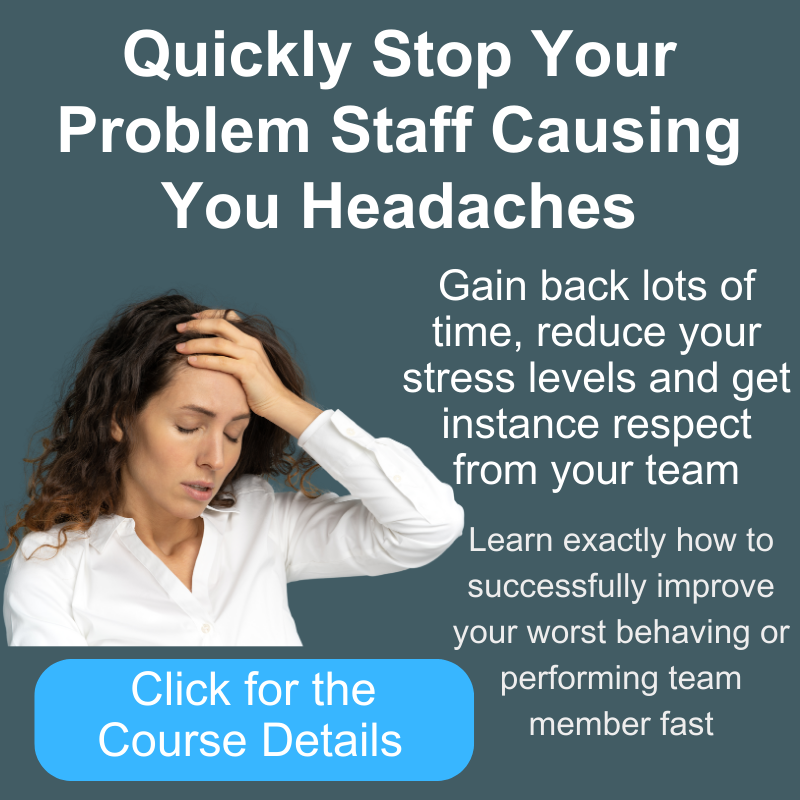7 Reasons to Build Emotional Resilience at Work plus 7 Ways to do it
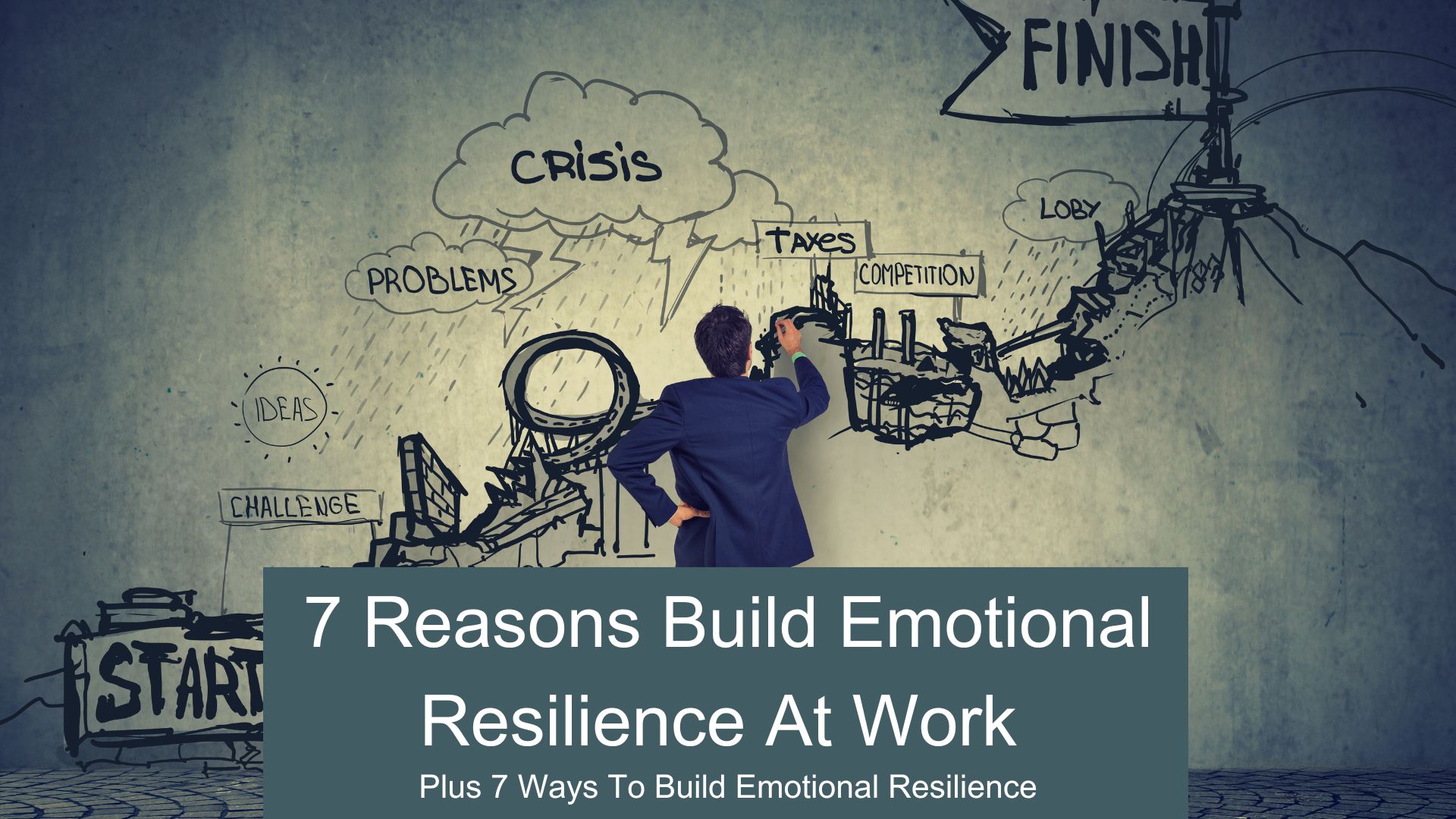
What does building emotional resilience at work really give you and how do you build and develop resilience are both questions I am answering today.
If you are heading towards or you are in the management ranks already, then building emotional resilience at work is a must. Managers need emotional resilience to do their jobs well.
Resilience is how effectively you can handle difficult experiences in your life and how you turn adversity or setbacks into opportunities. Managers and leaders in business face constant challenges from all directions. Without emotional resilience, the job would become overwhelming plus dealing with people always brings challenges.
With each way to build emotional resilience at work, I will share practical tips and steps for you to take.
7 ways to build emotional resilience at work
- Self-Awareness – a key to emotional resilience at work
- Maintain a positive mindset and learn to reframe
- Work on building effective communication
- Create strong support networks
- Develop your inner drive
- Celebrate successes
- Keep physically active
Watch On YouTube
Listen on Podcast
There are a ton of reasons to build emotional resilience. We all face challenges and setbacks in life. Those that are more resilient get through these challenges quicker, easier and with a more positive outcome.
I had big personal challenges to deal with from a young age, which helped me develop resilience and the belief that I could and would get through each challenge. This mindset and belief stood me in very good stead when faced with all the challenges that come with managing others and building a career in management.
Lets go through
7 critical reasons to build emotional resilience at work
To do well at work and certainly when you start managing and leading others, emotional resilience becomes an increasingly important factor. Challenges come up regularly and there are plenty of setbacks – at a personal level and through your team. Without emotional resilience, I think it would be really hard to do a good job.
7 key benefits of being emotionally resilient at work include:
1 . You are better at handling challenges.
Your team and everyone is watching how you react and deal with challenges and difficulties. When you are able to take them in your stride and not get too emotionally worked up, and focus on overcoming the challenges in a step by step approach, you give everyone a lot of confidence.
2. Better decision making
We make decisions using our emotions and justify those decisions with reason. Strong emotions can sidetrack our decisions and certainly reduce the checks that reasoning provides. Emotional resilience keeps our decision making clearer and less influenced by the actions and behaviours of others.
3. Manage conflicts constructively.
Positive conflict – such as differences of opinion and heated debate – produce really positive outcomes within a team, when managed well. I think you need to be emotionally resilience to manage positive conflict well. Negative, destructive conflict also requires plenty of emotional resilience to deal with and remove.
4. You are better at preventing burnout.
It takes confidence and emotional resilience to say no to work being requested of you. It takes resilience to fight to protect your team, to keep them from being overloaded, and keep them on course. Not being over worked will reduce your stress levels and the chances of burnout.
5. You will adapt to change better
Change is constant at work. The pace of change is the only real difference between one company to another. When you are resilient, you are able to manage a higher pace of change without it overwhelming you or causing too high stress levels etc.
6. Being better at maintaining personal well-being
If you are able to keep a positive mindset even when the problems are piling up, you are much more likely to maintain your personal well-being. This helps you remain effective and resolving issues.
7. You will be better at managing others
The ability to recognise and manage how you express your emotions and having emotional resilience, in my view, are critical qualities of good managers. The demands on you and your team are going to pull your emotions around and having good emotional resilience will help minimise the impact on you of the emotional ups and downs.
There are more reasons to build emotional resilience at work. Emotional resilience is a key quality to enable you to get good at what you do, in work and outside of work.
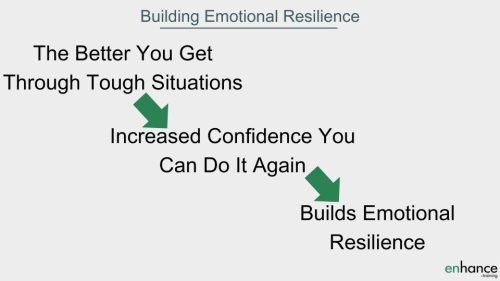
Now we are going to cover
How to build emotional resilience
The first way to build emotional resilience is to develop your own self-awareness
For instance, are you aware of what gets you annoyed, angry, frustrated, down in the dumps and all the other negative emotions we all have. When you are aware of your own triggers, you are much more able to create positive responses to the situation rather than let it negatively affect you.
Make time to reflect each day, on what went well and why and what didn’t go so well. Think about your reactions and what you might do differently next time. I often used my commute home for this reflection time – one of the best parts of my working day.
The second way to build emotional resilience is to maintain a positive mindset and learn to reframe
Your brain is brilliant at filtering out information. If it wasn’t so good, we would have sensory overload. It has been proven that if you look for the negatives, your brain filters out the positives and vice versa.
Consciously work at looking for the positives in a situation and you will be much more likely to find them. See challenges as opportunities to improve and learn. This approach is often referred to as a growth or learning mindset. When you work at focusing on the positives, you are much more likely to learn and improve. This is massive in terms of doing well at work
Put the work in to create a habit so that you look for the positives in every situation. Doing so will build your resilience and you will be a lot happier.
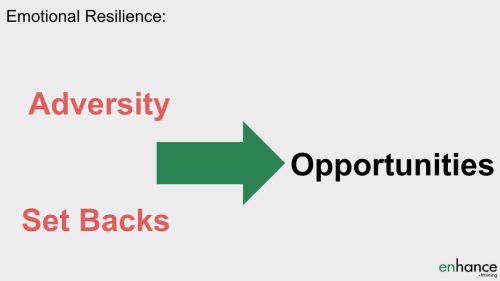
Work on building effective communication – The third way to build emotional resilience
Part of building emotional resilience at work is learning how to express your emotions in a positive and constructive way. When you experience negative emotions such as frustration and anger, don’t rant and rave at the unfairness of a situation, use labelling to tell people that you are frustrated and angry. E.g. I am really really angry about this situation. The benefit to you will be similar, but the effect on those around you will be a lot more positive.
Good communication also helps to build strong and deep relationships with friends and it helps foster open dialogue with team members. Good communication helps in giving and receiving useful feedback and in getting through tough situations with relationships intact. The better you get through tough situations, the more confidence you build that you will be able to the same again, which in turn builds emotional resilience at work.
Create strong support networks
Very few of us can cope with everything that life and work throws at us on our own. Knowing when to turn to others for help is as important as having others available to turn to.
Good supportive friendships take time to build and maintain. The ability to share your problems with good friends or family and know they will respond and help with your best interests in mind is incredibly valuable. Put the time into creating good strong support networks around you.
Go out of your way to help others and they are much more likely to return the favour when you ask. Strong support networks provide you with a lot more emotional resilience and the ability to cope with very tough challenges.
The fifth way to build emotional resilience is to Develop your Inner Drive
When you have worked out what you really want, when you have clear goals that you are striving to reach that matter to you, overcoming obstacles and challenges becomes easier. Having purpose and goals to reach, strengthens your will and increases your energy which makes getting through the tough patches much more achievable. You don’t lose your way or give up nearly as often and you can pick yourself up, dust yourself off and go again and again until you reach your goals.
Develop your inner drive by believing in and focusing on goals that really matter to you.
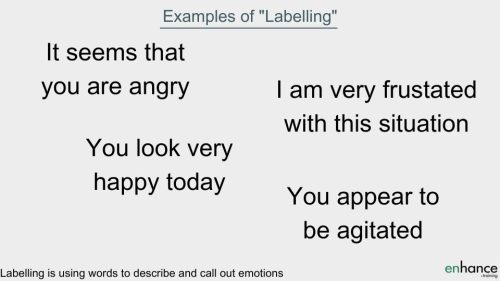
Celebrate success
When you are facing a tough challenge or set of challenges, making the time to celebrate all the little successes along the way, will help you keep taking the next step. This is a great way to keep up your motivation and drive.
Recognising and celebrating your successes builds your resilience over time. Building your experience and confidence in overcoming challenges, will make facing the next one easier and less daunting. Plus you will know that you can make it through because you have done so before.
Make the time to celebrate your successes to build your emotional resilience.
The seventh way to build emotional resilience is to keep physically active
Exercise gives you loads of benefits including:
- Lower stress levels,
- Better sleep
- Better physical health, digestion etc
- More energy
- Increased sense of self-worth
- Plus lots more
All these benefits help you directly or indirectly with the other six ways to build emotional resilience. Doing an activity that takes your mind and emotions away from your current challenges gives you a break to enable you to recharge.
Do make the time to stay physically active to improve your energy and all the other benefits this gives you to build emotional resilience.
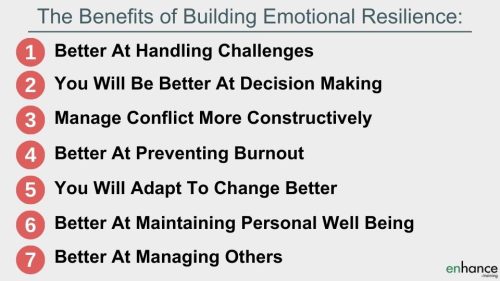
in summary
Building emotional resilience at work and for life generally, in my view, is necessary to be successful at just about anything. Becoming good at anything takes time and it take getting over numerous disappointments. Without emotional resilience you would give up well before you became good at your task, activity, hobby etc. Emotional resilience keeps you in the game.
As a reminder, here are 7 critical reasons to build emotional resilience at work
- You are better at handling challenges.
- Better decision making
- Manage conflicts constructively
- You are better at preventing burnout.
- You will adapt to change better
- Better at maintaining personal well-being
- Better at managing others
And the seven ways to build emotional resilience at work we have gone through are:
- Self-Awareness – a key to emotional resilience
- Maintain a positive mindset and learn to reframe
- Work on building effective communication
- Create strong support networks
- Develop your inner drive
- Celebrate successes
- Keep physically active
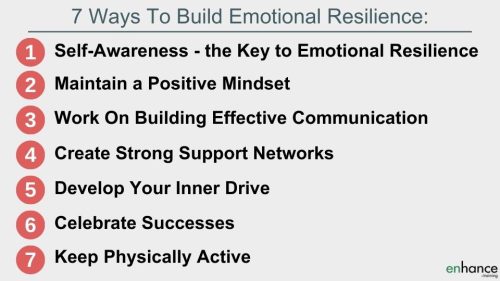
I think building self-awareness and emotional resilience are both really important if you want to do well managing teams and getting the best from those teams. Managing others well is not an easy job. If you don’t know yourself well and struggle to deal with tough or emotionally charged situations, managing others well becomes a lot harder.
Work on building your self-awareness and emotional resilience.



